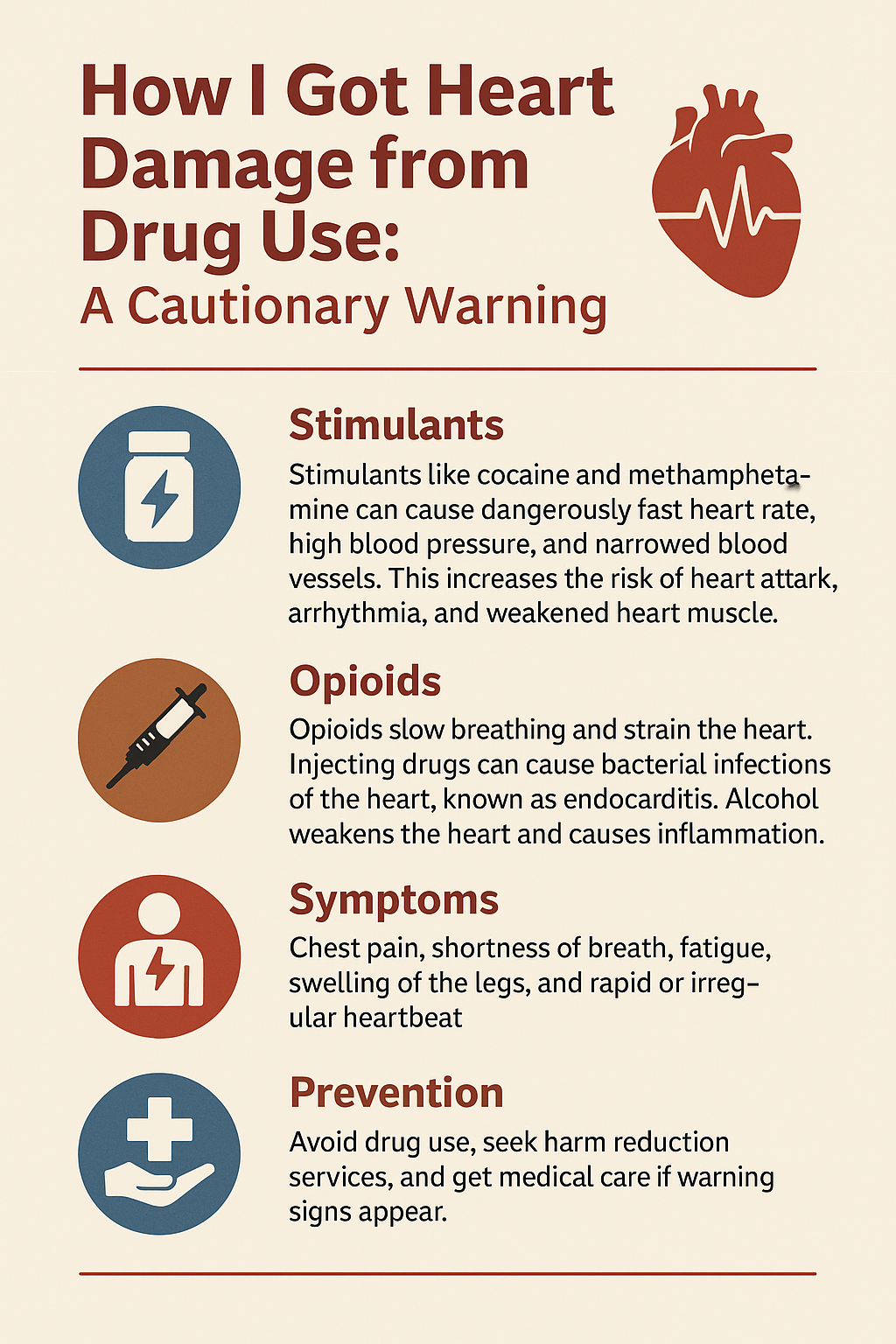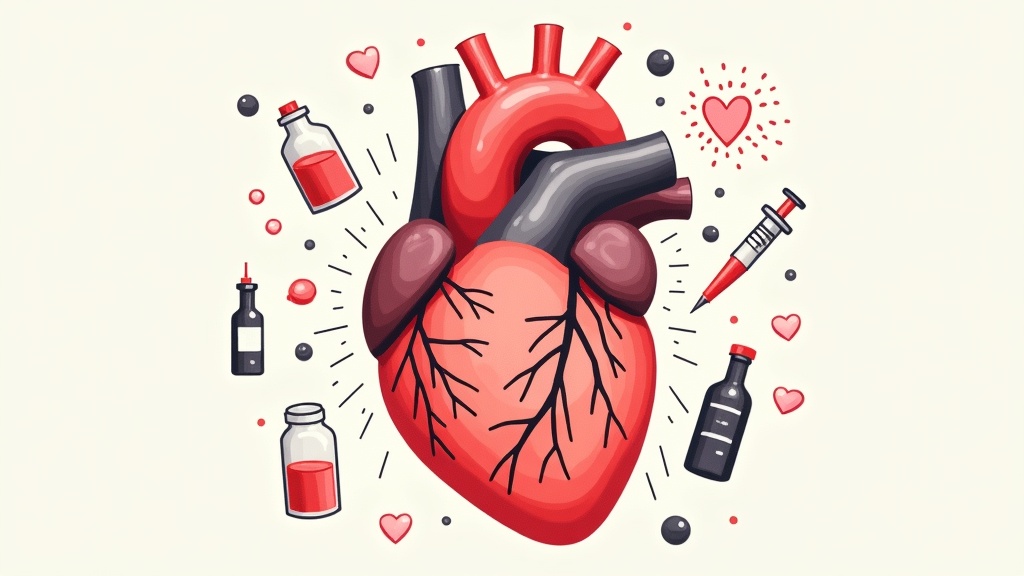Heart damage from drug use is often overlooked, but it’s one of the most serious health effects of substance misuse. Many drugs—legal, illegal, and even common everyday substances—can quietly strain the heart, weaken blood vessels, and disrupt normal heart function.
Early warning signs are easy to miss and often mistaken for stress or fatigue. Stimulants, opioids, alcohol, tobacco, and specific prescriptions each harm the heart in different ways, from raising blood pressure to triggering dangerous rhythms or increasing the risk of heart attack and stroke.
Ahead, I’ll break down how these substances affect the heart, the most significant risks to watch for, and what steps to take if you’re concerned about drug-related heart health.
The Real Impact of Drug Use on Your Heart
Your heart is basically the engine of your body, pumping blood and delivering oxygen to everything you do. When certain drugs get into your system, they can throw a wrench in those works. For instance, some substances speed up your heart rate, while others raise your blood pressure or cause your heart rhythm to become irregular. Over time, even recreational or short-term use can set you up for some pretty serious heart conditions.
Research shows that people who regularly use substances like cocaine, meth, amphetamines, or even misuse prescription drugs are a lot more likely to face heart problems than nonusers. According to the American Heart Association, these risks don’t just go away after stopping drug use. In fact, sometimes the damage sticks around or even gets worse if not addressed, especially with chronic and heavy use.
One big thing to remember is that even drugs regarded as mild or commonplace—think alcohol and nicotine—can add up and work against your heart over years of use. The effects are even worse if substances get mixed or if you already live with a heart condition. That’s why being aware of these risks is so essential for anyone using these substances, even occasionally.
Common Drugs That Harm Your Heart
A handful of substances are known, through years of medical reports and studies, to threaten your heart, especially:
- Cocaine: Triggers dangerous heart rhythms, tightens blood vessels, and can cause a heart attack even in young, healthy people. A single use can sometimes have profound effects.
- Methamphetamine: Causes intense surges in blood pressure and heart rate, raising the odds of strokes, heart attacks, and heart muscle inflammation.
- Opioids (like heroin, oxycodone, or morphine): Slow breathing and heart rate, sometimes so much that the heart doesn’t get enough oxygen. Injecting opioids also brings a risk of heart infections called endocarditis.
- Nicotine: Found in cigarettes and vapes, this drug hardens arteries over time and increases blood pressure, which slowly wears down your heart.
- Alcohol: Raises blood pressure and, in large or regular amounts, can enlarge and weaken the heart (a condition called cardiomyopathy). Heavy drinking is linked to arrhythmias, which are heartbeat problems.
- Prescription Stimulants: Medications like Adderall and Ritalin come with risks if used in the wrong way or without a prescription, especially when taken in high doses or for nonmedical reasons.
- Club drugs: Drugs like ecstasy (MDMA) can seriously disrupt heart rhythms and blood pressure control.
Mixing substances multiplies the risk. Even caffeine, if taken in really high doses, can throw your heart off. If you’re curious for a closer look at how substances damage the heart, the American Heart Association has some great resources that break it down.
Early Signs and Symptoms of Drug-Related Heart Damage
Not every heart problem looks or feels the same, and sometimes issues creep up without obvious warning. Still, some symptoms should make you sit up and pay attention. Things like:
- Chest pain or tightness, especially during or right after using drugs
- Heart palpitations, which feel like your heart is racing or flipping around in your chest
- Shortness of breath, either all the time or with physical activity
- Unusual fatigue or weakness
- Swelling in legs, feet, or stomach (a sign your heart isn’t pumping well)
- Episodes of passing out or feeling dizzy
If you or someone you know has these symptoms, especially in the context of drug use, it makes sense to check in with a healthcare provider. Waiting things out can be risky, since some of these signs point to emergencies like a heart attack or stroke.
How Damage Builds Up Over Time
Drug-related heart problems often don’t hit all at once. Instead, every use chips away at your heart’s strength. Here are some of the long-term conditions that can develop:
- Cardiomyopathy: This is when the heart muscle stretches and thins so it can’t pump blood properly. Both heavy alcohol and stimulant use can cause this.
- Arrhythmias: abnormal heart rhythms. Some are mild, but others literally stop the heart from working correctly. Many drugs can trigger arrhythmias.
- Atherosclerosis: Years of nicotine and some stimulants speed up plaque buildup in your arteries, raising the odds of a heart attack or stroke.
- Heart failure: When your heart can’t keep up with what your body needs, you end up short of breath, tired, and swollen. This is a typical final result after years of strain.
- Infective endocarditis: an infection of the inner lining of the heart, often caused by using unclean needles.
Most of these problems build quietly at first, so even people who feel pretty healthy sometimes find out later that their heart has been under stress for a long time.
How to Lower Your Risk and Protect Your Heart
If you’re concerned about the impact of drug use on your heart, or if you’re already dealing with some symptoms, there are steps you can take to reduce risk or start the path to recovery. Here’s what I recommend:
- See a doctor regularly, even if you feel fine. Catching heart troubles early makes a big difference and gives you more treatment options.
- Be honest about your drug use with your provider. This makes it much easier for them to spot issues and help you out without judgment.
- Get help for substance use, even if quitting feels impossible. Programs for drug use disorders are better than ever, and heart function often improves after stopping risky substances. The SAMHSA helpline is a free, confidential resource.
- Watch for symptoms. If you start to notice chest pain, an ongoing cough, trouble breathing, or anything else that seems out of the ordinary, talk to a clinician.
- If you inject drugs, clean needles help lower the risk of heart infections. Also, be aware that needle sharing can spread other diseases, so using new supplies each time can help your heart and general health.
- Build up other healthy habits like eating nutritious foods, moving your body, and sleeping well. These help your body repair and build resilience over time.
What to Consider if You’re Worried About Your Heart
Getting clear on your own risk and situation is a key step. If you’ve used drugs in the past—even if you don’t anymore—it’s pretty helpful to let your doctor know. You might want to ask for some basic heart checks, such as:
- Blood pressure readings
- An electrocardiogram (ECG or EKG)
- Blood tests (to check for heart strain or infection)
- An echocardiogram (an ultrasound of the heart, if there are symptoms)
Sometimes, people feel ashamed to bring up drug use, but doctors see these issues all the time—it’s part of the job, not something they judge you for. The earlier heart problems are detected, the easier they are to manage. Your honesty can actually make a massive difference to your future health, so don’t hold back in your conversations.
Mixing Substances and Other Risk Factors
Certain things make heart risks worse. Using more than one drug at a time, like mixing cocaine and alcohol, makes each effect stronger and harder for your body to handle. If you have a family history of heart disease, diabetes, high blood pressure, or are a smoker or drug user, your heart might be impacted even more.
Age, personal health history, and how much of a drug you use (and for how long) also play a part, so that the risk can be really different from person to person. Think about all the factors in your health, not just the drug use alone, when talking to your healthcare team.
FAQs About Drug Use and Heart Health
Common questions pop up all the time, so here’s my take on a few:
Question: Can heart damage from drugs be reversed?
Answer: Sometimes, yes. Especially if the damage is caught early and you stop using the substance. In some conditions, the heart can heal and get stronger, but in others, the damage may be permanent or require lifelong treatment. Staying away from the risky drugs and regular check-ups really helps recovery.
Question: Are legal drugs like alcohol and nicotine just as bad for your heart as illegal ones?
Answer: They can be. While some legal drugs have different risk profiles, long-term use still raises your odds of heart disease, stroke, and other health problems. Sometimes, because they’re so common, the risk sneaks up slowly.
Question: How fast can drug use cause heart problems?
Answer: That depends on the type, amount, and how often you use it. Some drugs (like cocaine or meth) can lead to heart trouble after just a single use, while with others like alcohol or nicotine, it usually builds up after years. But mixing substances always magnifies risk.
Question: Is medical marijuana safe for your heart?
Answer: The effects of marijuana on the heart are still being researched. Some studies show a slight rise in heart rate and blood pressure right after use, which could be risky for people with heart concerns. Following a doctor’s guidance is the safest path if you have concerns about your heart health.
Why Paying Attention to Your Heart Is Worth It
Heart health can seem like an issue that doesn’t need attention until there’s a crisis, but the effects of drugs on the heart can creep up quietly over time. Watching for early signs, talking openly with healthcare providers, and taking steps to protect your heart make a real difference. Even small moves toward better habits matter, whether it’s getting more sleep, managing stress, or reaching for healthy foods.
No matter your story or background, knowledge and support genuinely help. If you’re feeling worried about your heart or drug use, reaching out is a sign of strength and self-care, not trouble. The resources are out there, and catching trouble early gives you the power to turn things around. Support groups, counseling, and healthcare providers all play a part in helping you move forward.
If you’re interested in reading more about this topic, the Centers for Disease Control and Prevention website is a reliable source for stats and in-depth information.
Video: Shocking Ways Drugs Hurt Your Heart!

